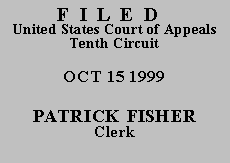

| CLEOPHUS E. TEMPLE,
vs.
STEVE KAISER |
|
On January 11, 1995, Mr. Temple pled guilty to state charges. He later filed a timely motion to withdraw his plea. The state district court denied this motion. On November 30, 1995, the Oklahoma Court of Criminal Appeals denied Mr. Temple's petition. Therefore, Mr. Temple's conviction became final for the purposes of 28 U.S.C. § 2244 (d) on February 28, 1996, when his time for filing a petition for a writ of certiorari with the Supreme Court expired.
On April 22, 1997, Mr. Temple filed a federal habeas petition. The federal district court dismissed his petition without prejudice as a mixed petition on November 24, 1997. Mr. Temple then attempted to exhaust his claims by filing an application for state post-conviction relief, and denial of relief was upheld on appeal on February 19, 1998. Mr. Temple asserts that this time spent attempting to exhaust his state claims was counted against him, and caused his federal petition to be considered untimely. This is incorrect. The one year limitation was tolled during Mr. Temple's attempt to properly exhaust his claims. Barnett v. LeMaster, 167 F.3d 1321, 1323 (10th Cir. 1999). It was Mr. Temple's delay of over four months, until June 30, 1998, before filing the federal petition at issue that made his petition untimely.
On appeal, Mr. Temple asserts that AEDPA does not apply to him, because his conviction became final before the effective date of the Act. However, whether AEDPA applies is dependent on the date on which the habeas petition was filed, not on the date petitioner's conviction became final. AEDPA applies to all habeas petitions filed after the date of the Act, regardless of the date of conviction. See Lindh v. Murphy, 521 U.S. 320, 326-27 (1997).
Mr. Temple further argues that the one year limitation is an ex post facto law. However, the law does not "alter[] the definition of criminal conduct or increas[e] the punishment for the crime[.]" Fultz v. Embry, 158 F.3d 1101, 1102 (10th Cir. 1998)(quoting Lynce v. Mathis, 519 U.S. 433,441 (1997)). Thus, it cannot be considered an ex post facto law.
State prisoners whose convictions became final before April 24, 1996 had until April 23, 1997 to file a federal habeas petition. See 28 U.S.C. § 2244(d)(1); United States v. Simmonds, 111 F.3d 737, 746 (10th Cir. 1997). The one-year limitations period in § 2244(d)(1) is tolled by time spent pursuing post-conviction relief in state courts. See § 2244(d)(2); Hoggro v. Boone, 150 F.3d 1223, 1225 (10th Cir. 1998). Because Mr. Temple waited until April 22, 1997 to file his application for habeas relief, only two days before the expiration of the grace period, his filing extended the grace period for not more than two days after exhaustion of any state post-conviction remedy. Thus, in order to be timely, this petition should have been filed by February 21, 1998.
This limitations period is procedural rather than jurisdictional and is subject to equitable tolling where extraordinary circumstances beyond a prisoner's control make it impossible to file a petition on time. See Miller v. Marr, 141 F.3d 976, 978 (10th Cir.), cert. denied, 119 S. Ct. 210 (1998). Petitioner has provided no basis for equitable tolling of the relevant one-year limitation period, such as evidence that "a constitutional violation has resulted in the conviction of one who is actually innocent or incompetent." Id. Mr. Temple claims that the reason he waited over four months to file this appeal is that he did not have the $5 filing fee. However, this argument is unavailing. The court wrote to Mr. Temple on May 13, 1998 informing him that he could either pay the filing fee or file a motion to proceed in forma pauperis (IFP). Mr. Temple waited until June 30, 1998 to file this petition and his motion to proceed IFP.
We agree with the district court that Mr. Temple has failed to diligently pursue his claims, and thus conclude that his petition is untimely pursuant to § 2244(d)(1). Plaintiff's motion for leave to proceed on appeal without prepayment of costs or fees is GRANTED. However, because Mr. Temple has not "made a substantial showing of the denial of a constitutional right," 28 U.S.C. § 2253(c)(2), we DENY his request for a certificate of appealability and DISMISS
the appeal.
Entered for the Court
Paul J. Kelly, Jr.
Circuit Judge
*. This order and judgment is not binding precedent, except under the doctrines of law of the case, res judicata, and collateral estoppel. This court generally disfavors the citation of orders and judgments; nevertheless, an order and judgment may be cited under the terms and conditions of 10th Cir. R. 36.3.
**. After examining the briefs and the appellate record, this three-judge panel has determined unanimously that oral argument would not be of material assistance in the determination of this appeal. See Fed. R. App. P. 34(a); 10th Cir. R. 34.1 (G). The cause is therefore ordered submitted without oral argument.